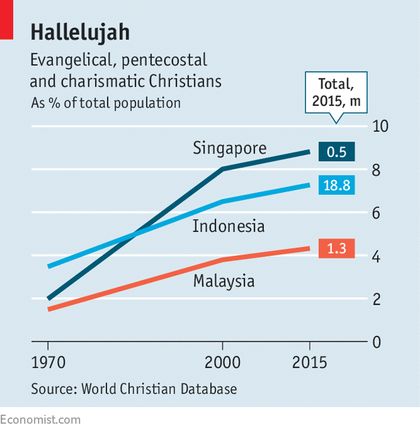A study shows that over 50% of mega-church-goers in Southeast Asia, have a university degree, are Chinese, and come from families which were not previously Christian.
 Singapore. / Pierpaolo Lanfrancotti (Unsplash, CC)
Singapore. / Pierpaolo Lanfrancotti (Unsplash, CC)
Evangelical and Pentecostal Christianity is growing more quickly in Asia than most parts of the world, with over 200 million adherents in 2015, up from 17 million in 1970, according to a report by The Economist.
The largest congregations are in South Korea and the Philippines, where mega-churches hold tens of thousands of people.
QUICK GROWTH IN SINGAPORE
According to Terence Chong of the think-tank ISEAS–Yusof Ishak Institute, in Singapore, which is mainly Chinese, evangelicalism first took off in the 1980s.
Mega-churches began springing up in the early 1990s and grew quickly, despite the fact that the Singaporean government is wary of proselytisers potentially stirring up religious tensions.
Evangelicals, including many Pentecostals, made up 8% of the population in 2015, up from 2% in 1970.
BEING A CHRISTIAN IN MUSLIM-MAJORITY COUNTRIES
Christian congregations are also increasing in other parts of the continent, including Indonesia and Malaysia.
Although proselytising among the Muslim majority is well nigh impossible, Buddhists, Confucians, as well as other denominations, almost all of them ethnically Chinese, are proving receptive.
Roughly a tenth of the population of both countries is Christian, but bureaucrats make life difficult for churches, largely for fear that they will attempt to convert members of the Muslim majority.
INDONESIA AND MALAYSIA
Over 1,000 churches were closed in Indonesia between 2006 and 2014, says Andreas Harsono of Human Rights Watch, a pressure group.
In Malaysia, it is illegal for a Muslim to convert to Christianity, even though the constitution theoretically enshrines freedom of religion.
 Source: The Economist.
Source: The Economist.Additionally, Malaysia has Islamic police to make sure Muslims do not marry adherents of other religions or deviate in other ways. Despite this forbidding setting, the proportion of the population that is evangelical has grown rapidly.
MIDDLE CLASS CHINESE CHURCH-GOERS
A study of the ISEAS–Yusof Ishak Institute conducted in 2013, showed that over 50% of mega-church-goers had a university degree, a higher proportion than Christians of other sorts.
They were also more likely to speak Chinese and to come from families which were not previously Christian.
“It is the de facto middle-class religion right now”, says Mr Chong.
COOPERATION BETWEEN COUNTRIES
The growth of evangelical churches in the three countries also shows how they are “increasingly connected”, says Max Jeganathan of the Zacharias Trust, a Christian organisation based in Britain.
Christians across the region support each other financially, he says; several churches in Singapore have helped “plant” others in Malaysia or elsewhere.
PROSPERITY GOSPEL AND A PLACE TO NETWORK
Despite the growth, one problem of these countries is that many of South-East Asia’s megachurches preach an American-style “prosperity gospel”.
In the New Creation Church, a mega-church in a mall in Singapore, first-time visitors are given a pop-up book telling the story of the venue. The 30,000 worshippers there have to book online on a Wednesday to reserve a seat for the Sunday service.
Friendly ushers and peppy slogans (“too blessed to be stressed”) make the churches appealingly accessible. They are also good spots for making business connections.
“Churches in Singapore are places where people network with those they trust. The feeling is that these are people we know, these are people of integrity, character, education, Thomas Harvey of the Oxford Centre of Mission Studies, a British charity, told The Economist.

Las opiniones vertidas por nuestros colaboradores se realizan a nivel personal, pudiendo coincidir o no con la postura de la dirección de Protestante Digital.
Si quieres comentar o